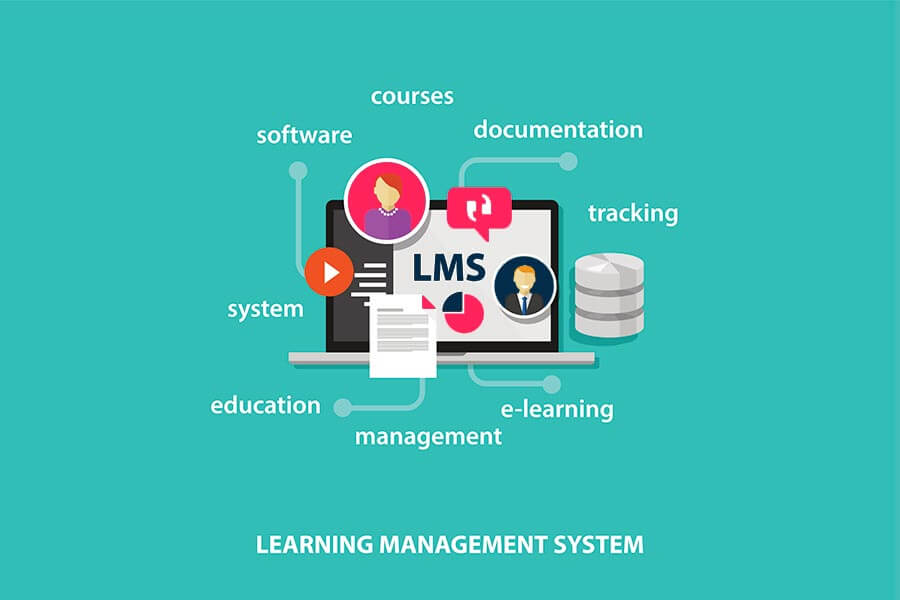“The purpose of education is to replace an empty mind with an open one”, Malcolm Forbes
Learning Management Systems (LMS) have revolutionized learning and training, making education more accessible, efficient, and engaging. These platforms are now essential in academic and corporate environments, enabling seamless content delivery, user management, and performance tracking.
With the rapid growth of the e-learning market, understanding how LMS platforms operate is more critical than ever. LMS platforms offer personalized, scalable solutions that drive impactful learning experiences, from course creation to tracking learning outcomes.
Core Features of Learning Management Systems
Learning management systems (LMS) are vital to understanding today’s learning. They make learning more accessible and effective, changing how we approach learning and growth in organizations.
Platform Architecture and Components
An LMS has a strong base that connects different parts. It has a user-friendly interface, a system for managing content, testing tools, and detailed reports. These parts work together to manage learning from start to finish.
Platform Architecture and User Roles
An LMS integrates multiple components into a cohesive framework. Key elements include a user-friendly interface, robust content management systems, and detailed reporting tools. These systems cater to various user roles—administrators manage configurations, instructors create engaging courses, and learners access tailored educational materials—all within a secure environment.
Content Delivery Methods
LMS systems offer many ways to share content. They have interactive videos, virtual classrooms, self-paced courses, and discussion forums. This lets organizations tailor learning to fit their audience and projects. There is a whole different kind of LMS for learning content creation and organizing, the LCMS. Learning Content Management Systems (LCMS) are tailored for businesses that require tools to create and manage content. Unlike Learning Management Systems (LMS), which primarily focus on course delivery and user management, LCMS platforms specialize in the creation, organization, and distribution of learning materials.
The Evolution of E-Learning Software Development
The world of e-learning has changed a lot since the start. Learning management systems (LMS) have significantly evolved, shaping today’s e-learning market. Technology and demand for better learning have driven this change from simple computer-based training to today’s cloud-based LMS.
At first, e-learning software mainly offered text and multimedia content. But, as technology improved, LMS platforms added interactive features like quizzes and progress tracking. This made learning more personalized and effective for everyone in the e-learning market.
Software for LMS has played a crucial role in e-learning’s growth. As technology improved, LMS became easier to use, grow, and connect with other systems. This has made learning online better and easier to manage for all.
Key Features and Capabilities of Modern LMS Platforms
Learning management systems (LMS) are key in today’s e-learning world. They help make online education and training effective. These platforms have many features that help both learners and those who manage them. Let’s look at what makes modern LMS solutions great.
Course Creation Tools
Engaging in courses is vital for any LMS. Today’s systems have tools that make creating and organizing courses easy. With drag-and-drop interfaces and multimedia options, creating interactive courses is simpler than ever.
Assessment and Progress Tracking
It’s essential to track how well learners are doing. Modern LMS platforms have tools for this, like quizzes and surveys. They also offer detailed reports, helping to see how well learners are doing and where they need help.
Integration Capabilities
LMS platforms can connect with other tools and systems, including video conferencing and HR systems. This makes learning smooth and connected, sharing data and resources across different platforms.
Benefits of Implementing a Learning Management System
Using a learning management system (LMS) benefits schools and companies. It helps deliver consistent training that can grow with your needs, leading to better learning results.
An LMS simplifies the creation and sharing of learning materials. This means learners are more engaged and remember what they learn better. It also helps track how well learners are doing, helping to improve training over time.
In corporate settings, an LMS saves money by reducing the need for face-to-face training and travel costs. Employees can learn when it’s most convenient for them, which makes them more productive. It also helps keep training up to date with rules and regulations.
Corporate Training Solutions and Use Cases
Today’s businesses see the benefits of using a learning management system (LMS) for corporate training. They use LMS for many things, like training new employees and keeping current staff up-to-date. These systems are essential for companies to stay ahead in the market.
Employee Onboarding Programs
Starting new employees can be complex and slow. But a good LMS makes it more accessible. It lets companies create engaging training, track employees’ performance, and help them fit in quickly.
Skills Development Initiatives
Keeping skills sharp is vital in today’s fast-paced world. LMS platforms help companies offer focused training, check employee performance, and find areas that need work. This way, businesses can attract happier employees and perform better overall.
Compliance Training Management
Following rules and company policies is very important. Learning management systems offer a place to handle all compliance training. They help track who has finished training and provide reports showing they follow the rules. This allows companies to avoid problems and keep a responsible work culture.
Academic Applications and Educational Impact
Learning management systems (LMS) have changed the academic world. These systems have become vital in both traditional and online learning. They are now used in K-12 schools and colleges, shaping the future of online learning.
LMS platforms are at the heart of digital learning. They make sharing content easy, keep students involved, and track their progress. Teachers use them to make courses more engaging, start discussions, and see how students are doing.
Using LMS has improved education. Studies show students are more engaged, remember, and finish their courses more often. These systems offer a place for all learning materials, communication, and tests. They also change how students and teachers work together with course materials.
When LMS is used well, it can change education. It helps with new teaching methods like flipped classrooms and online courses, which let students and teachers use technology to learn in new ways.
Measuring ROI and Performance Metrics
Organizations invest in a learning management system (LMS) to see a return on investment (ROI). It’s important to track the platform’s performance. Businesses can maximize their LMS by understanding its benefits and tracking key success indicators.
Analytics and Reporting Features
Today’s LMS platforms have strong analytics and reporting tools. These tools give insights into user engagement, course completion, and learning outcomes. These reports help identify areas for improvement and create better learning experiences.
Success Indicators
Success with an LMS is seen in increased productivity, better knowledge retention, and meeting training needs. Tracking these KPIs shows the LMS’s natural benefits.
Performance Optimization
By analyzing LMS data, businesses can improve their learning programs. They can adjust content and personalize learning, making the LMS a valuable asset supporting the company’s goals.
Common Challenges and Solutions in LMS Implementation
Starting a learning management system (LMS) can change how organizations work. But, it comes with its own set of problems. One big issue is getting people to use the system. Technical issues like integration problems or a hard-to-use interface can also slow things down.
But there are ways to solve these problems. Offering detailed training and planning for change can help people get used to the system. Choosing an LMS that fits your needs and works well with other systems can also help. Plus, listening to feedback and improving the system over time is key.
Organizations can make the most of their LMS by tackling these challenges and using the right strategies. This leads to a more engaged and skilled workforce or student body. The main thing is to focus on making the system easy to use and constantly improving.
Future Trends in Learning Management System Development
The world of software development for e-learning is changing fast. Learning management systems (LMS) are leading these changes. As people want better online learning, LMS platforms will bring innovations. These will change how we learn in schools and at work.
AI Integration
Artificial intelligence (AI) is making LMS systems even better. AI lets systems tailor learning to each person’s needs, making learning more effective and fun and helping everyone learn more.
Mobile Learning Advances
More people are using mobile devices, which is changing e-learning. Future LMS systems will make learning even more mobile-friendly. You can quickly learn and fit it into your life anytime, anywhere.
Personalization Features
Personalization is becoming a big deal in LMS systems. These systems will focus on meeting each learner’s unique needs, making learning more engaging and effective. Features like customizable dashboards and adaptive feedback will also help.
Unlocking the Potential of Learning Management Systems
Learning management systems are no longer optional but critical to effective education and business strategies. LMS platforms streamline learning, improve engagement, and offer measurable outcomes for academic institutions or corporate environments.
By leveraging LMS technology, organizations can foster continuous growth and innovation. And with emerging trends like AI and mobile learning, the future of LMS holds even greater promise. Embrace these tools today to drive meaningful learning experiences for tomorrow.







